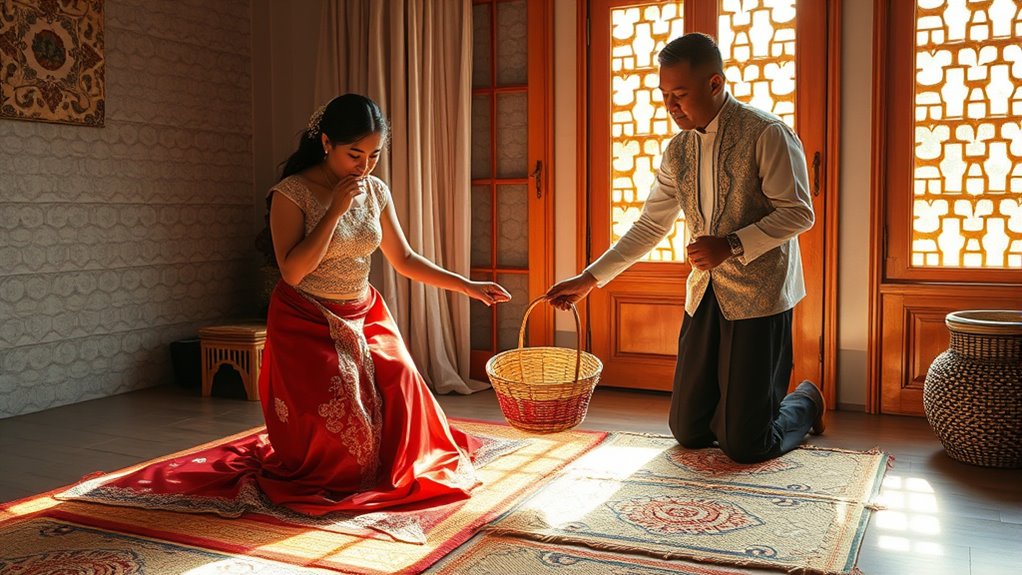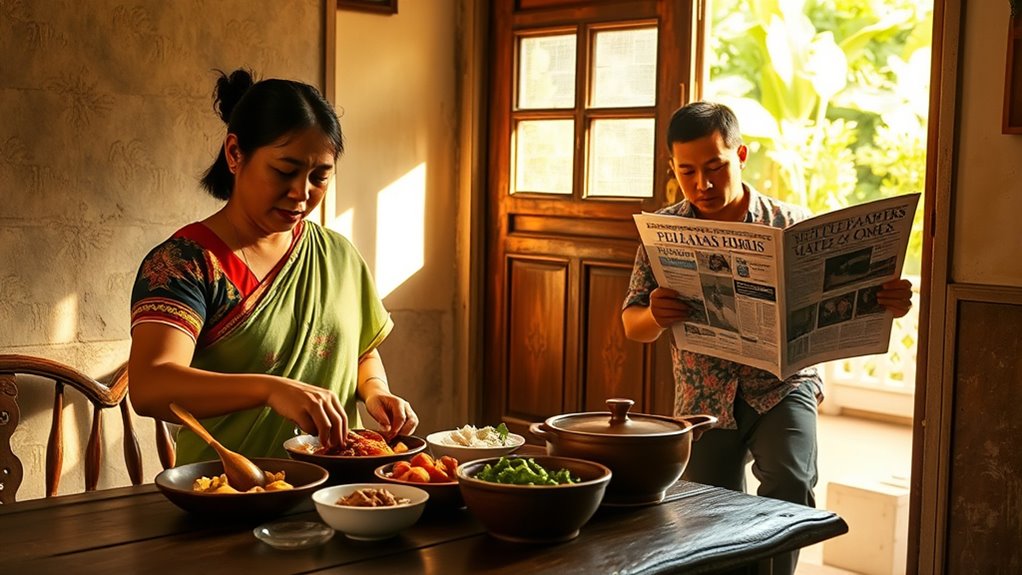In Filipino culture, after marriage, you’re expected to see wives focus on managing the home, caring for children, and providing emotional support, even if both partners work. Husbands are viewed as main providers, responsible for financial stability and upholding family honor. These roles are deeply rooted in tradition and influence daily family life, decision-making, and social expectations. If you continue exploring, you’ll gain a clearer understanding of how these roles shape Filipino family dynamics.
Key Takeaways
- Filipino wives are expected to manage household chores, care for children, and provide emotional support despite working outside.
- Filipino husbands primarily serve as breadwinners, focusing on financial stability and family reputation.
- Both spouses maintain strong family ties, supporting extended relatives and participating in cultural traditions.
- Decision-making often aligns with traditional gender roles, with husbands leading major choices and wives managing domestic matters.
- Cultural norms emphasize sacrifice, family honor, and emotional labor, reinforcing traditional post-nuptial roles for wives and husbands.

In Filipino culture, marriage marks not just a union between two individuals but also a shift in social roles and responsibilities that continue long after the wedding day. As a wife or husband, you’re expected to adapt to traditional gender expectations that shape daily life and interactions within the family. These expectations influence how you allocate household chores, decision-making, and your overall contributions to the family unit. For women, this often means taking on the primary role of managing the home, caring for children, and ensuring the household runs smoothly. Men, on the other hand, are generally seen as the breadwinners, responsible for providing financial stability and making major family decisions. These roles are deeply ingrained in Filipino society, and they influence how family responsibilities are divided and prioritized.
Marriage in Filipino culture involves traditional gender roles that influence family responsibilities and daily interactions.
You might find that, as a wife, you’re expected to prioritize caring for your children and maintaining the household, often with a focus on nurturing and emotional support. While partners are encouraged to share responsibilities, the cultural norm still leans toward women being more involved in domestic duties. This can sometimes lead to a gendered division of labor that feels natural or expected, even if both partners work outside the home. As a husband, your role often centers around being the primary provider, which can place pressure on you to secure financial stability and uphold the family’s reputation. This gender expectation can shape how you view your responsibilities, sometimes making it challenging to share household chores or emotional labor equally.
Family responsibilities extend beyond just household chores. In Filipino culture, maintaining strong family ties and respecting elders are considered vital post-marriage duties. You’re expected to uphold family honor, support your parents and extended relatives, and participate actively in family gatherings and traditions. These responsibilities reinforce the idea that marriage isn’t just about the two of you but also about the broader family network. For wives, this might mean balancing their own nuclear family with obligations to in-laws, often involving sacrifices to meet family expectations. For husbands, fulfilling family responsibilities can mean stepping into roles that reinforce the family’s social standing or financial needs.
Additionally, cultural norms around gender roles often influence expectations regarding emotional labor and decision-making within the household. Ultimately, these gender expectations and family responsibilities shape your behaviors and choices after marriage. They serve as a framework that guides how you contribute to the family’s well-being, uphold cultural values, and navigate your roles within the household and community. While modern influence continues to challenge traditional norms, understanding these core expectations helps you appreciate the cultural context that still influences Filipino post-nuptial roles today.
Frequently Asked Questions
How Do Post-Nuptial Roles Vary Across Different Regions in the Philippines?
You’ll notice that regional customs and cultural diversity in the Philippines influence post-nuptial roles considerably. In some areas, traditional expectations emphasize family caregiving and household duties for wives, while men focus on providing. However, these roles can shift depending on local beliefs and modern influences. Across regions, you’ll see a mix of traditional and evolving roles, reflecting the country’s rich cultural diversity and changing societal norms.
Are There Legal Implications Tied to Traditional Post-Nuptial Roles?
You might wonder if traditional post-nuptial roles carry legal implications. While cultural obligations often shape these roles, Philippine law generally emphasizes gender equality and individual rights. However, in some cases, legal considerations like property rights or family law may be connected to these roles, especially if they influence contractual agreements or inheritance. It’s essential to understand that cultural expectations don’t override legal protections, which aim to ensure fairness for both spouses.
How Do Modern Filipino Couples Negotiate Role Expectations?
You and your partner often negotiate role expectations by openly discussing gender expectations and household division. You might share chores equally or adapt based on each other’s strengths and preferences. Communication helps you break traditional norms, ensuring both feel valued and supported. This approach fosters mutual understanding, allowing you to create a partnership that respects individual needs while balancing household responsibilities effectively.
What Influence Do Religious Beliefs Have on Post-Nuptial Roles?
Religious influence shapes your view of post-nuptial roles by instilling faith-based expectations about gender duties and family responsibilities. Your beliefs may encourage you to prioritize traditional roles, seeing marriage as a spiritual commitment where each partner fulfills specific functions. Faith guides your decisions and interactions, often reinforcing cultural norms. This spiritual framework can influence how you and your partner navigate shared responsibilities, balancing modern practices with religious values.
How Do Societal Changes Impact Traditional Gender Roles in Filipino Marriages?
Imagine a bamboo bending with the wind—your marriage faces societal changes that cause gender role shifts. These shifts symbolize resilience and flexibility, allowing cultural adaptation. As modern values grow, traditional roles evolve, empowering both partners to share responsibilities. You’ll see a shift from rigid expectations to a more balanced partnership, reflecting contemporary Filipino society. Embracing these changes means nurturing equality and understanding, strengthening your bond amid evolving cultural landscapes.
Conclusion
Think of your marriage as a delicate boat steering the vast ocean of Filipino culture. Just as every sailor must work together to keep the vessel steady, so must you and your partner share the oars—balancing expectations and roles. Embrace the winds of change while honoring tradition, and you’ll steer your journey smoothly. Remember, when both of you row in harmony, your love becomes an unbreakable anchor amid life’s unpredictable tides.









